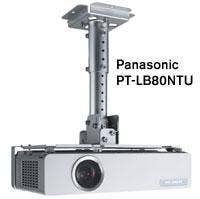Review: Wireless Projector Packs A Punch
The touch-sensitive control buttons on the top of the unit are really more like fingertip-sized valleys carved into the plastic. We found them to be a little too sensitive—when reaching to touch a particular button, just barely touching any of the others would sometimes accidentally open a new menu or change the current menu selection.
Most likely for this reason, Panasonic wisely includes a power button lock that is turned on by default. To power on the projector, you must first touch the release button. This provides a layer of protection against accidentally burning out the bulb.

Upon powering up, you're greeted with the display of a chart that shows the most popular laptop brands along with the respective button combinations necessary to switch the video output. This is a nice feature we've seen in the past for those who don't always use the same computer, or just aren't familiar with the one they have.
Once a video signal is detected the projector automatically switches to it. The input device can also be manually selected via the top panel buttons or the included remote. Multiple inputs on the back of the unit include S-Video, Composite Video, Component Video and a D-Sub 15 connector. There is also an additional D-Sub 15 port that can be configured via the menu to be used either as another input or as an output. Standard audio connections are also available to power the internal 1-watt speaker.
We found that the 3,200-lumens lamp projected a nice, sharp 1,024 x 768 image with colors that didn't wash out, even with all the lab lights on and various monitors running. This is probably due in part to Panasonic's Daylight View 4 image processing, which works with a small ambient luminance sensor on the top of the projector to optimize color, brightness and contrast according to the ambient lighting conditions in the room.
When compared to 17 test patterns in the DisplayMate calibration suite, the PT-LB80NTU displayed all of them without the need for adjustment, although, as with most projectors, we did feel the black level was low and the whites were a little cool.
Panasonic specifies power consumption at 300 watts and we saw a steady draw of about 240 watts. Sound levels were below the 50dB threshold of our meter but are rated at 29dB in Eco Mode. Temperature readings over most of the unit measured about 97 degrees Fahrenheit, with the highest reaching 165 degrees at the air vent.
The built-in 802.11b/g wireless networking allows computers to attach to the projector via Wi-Fi using the Wireless Manager Software on the included CD-ROM. The surprise? By using the software (which can be run directly from the CD or a flash card, without installation), a computer with a Wi-Fi card can connect to the projector without the need for a network to even be present.
In the Wireless menu of the projector, the user can select one of four pre-configured profiles numbered 1 through 4. By choosing the same number in the software, the computer will find the projector and connect. Once connected, the computer's screen is also displayed by the projector. In addition, there is virtual remote control functionality and a Web browser control for setting and adjusting the projector and displaying its status.
The Wireless Manager Software allows one computer to simultaneously connect to multiple projectors and vice versa. Users can also select only a partial area of their screen to project. Test Center reviewers found the wireless features to be very useful and worked flawlessly with very little lag time. There was a minor incompatibility with a screenshot application that was running in the background on our Windows PC, but we found that if we opened that application after connecting to the projector, everything worked fine.
While the PT-LB80NTU is a little larger than we would like a portable projector to be, it is light enough to take on the go when needed. Additionally, its wireless functionality allows for many creative uses. The Panasonic PT-LB80NTU projector has a MSRP of $3,299. Additional models are also available with lower brightness, no Wi-Fi and in wide-screen format.